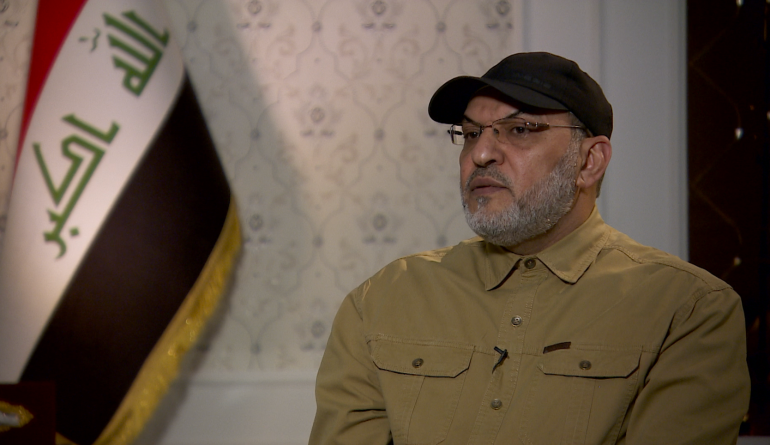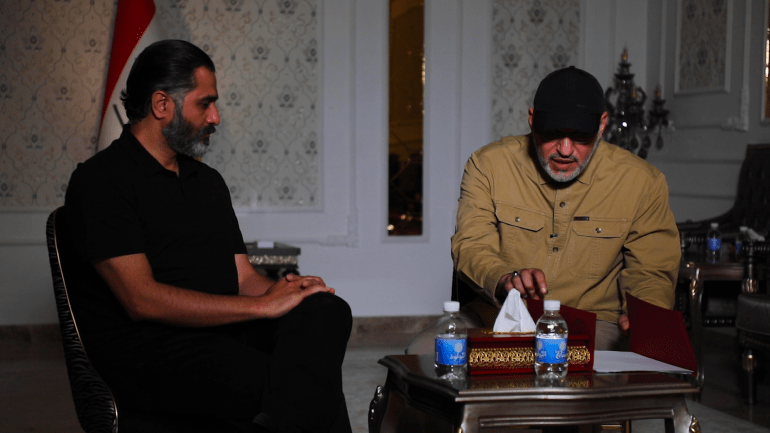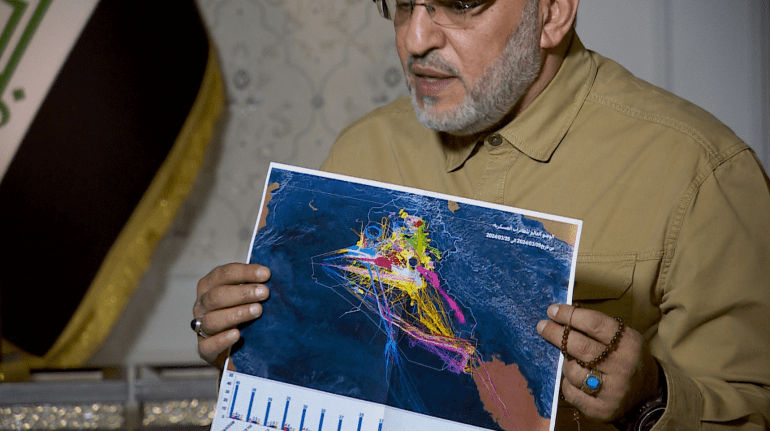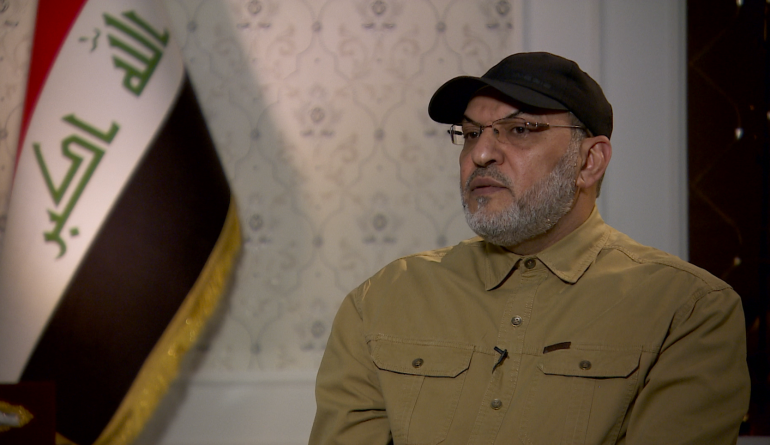As we drive into the nondescript building, past the lawn, we are asked to park in the shade, presumably to provide cover from the prying killer robots watching us.
It is April 18, one day before Israel launched several drones at Iran after Iran itself launched a barrage of drones and missiles on Israel on April 13. That, in turn, was a response to an Israeli attack on Iran’s consulate compound in Damascus which killed 16 people, including two senior generals.
This is a building in Baghdad on the bank of the Tigris river, situated perhaps intentionally opposite the sprawling US embassy compound on the other side. Iraq’s non-state actors say the US occupation will only be over when all American troops leave the country.
Inside the building is the man I have come to meet and who has been designated a terrorist by the US government. This is the safe house where Abu Ala al-Walai – the secretary-general of the Iran-backed Iraqi armed group, Kata’ib Sayyid al-Shuhada (KSS) – is waiting for us.
As we walk inside the compound, men with holstered guns line the hallway while an aide greets us warmly. We are presented with traditional Iraqi hospitality and discuss parameters for the interview.
To understand all sides of any story, one must interact with all sides. That often means talking to people who one side or another views as “terrorists”.
As journalists, our job provides rare opportunities for interaction and glimpses into the thought processes of many people – including those to whom talking might be a daunting prospect because of their violent actions and “terrorist” labels which make them outcasts.
I’ve interviewed members of Iraqi armed groups, Syrian armed groups, Afghan armed groups as well as a variety of other non-State actors. But even when we interact with American, British, Italian or other troops, they, too, are frequently labelled as “terrorists” by their opponents.
Each side always has a list of reasons of why “the other” is a terrorist.

‘We will have the final strike’
Abu Ala al-Walai is not known for making public appearances, especially in the past six months. His group, KSS, has been launching attacks on US interests which it links to Israel in Iraq and Syria.
He enters the room with a smile and tells our cameraman to not be afraid as he comes closer to put on the mic. Judging by our calm demeanour, he asks: “Are you not afraid?” I explain to him that he is among many “wanted and unwanted“ men that I have spoken to in the past.
We had agreed to a five-minute interview, but much later into our conversation we realise it’s been half an hour.
He is frank with his characterisation of what KSS believes are acts of defiance, but which its opponents view as acts of terrorism. He says he is proud to wear the “terrorist” badge given by the United States. He believes, he tells us, in the ideology of Ayatollah Khomeini – that the US is the biggest evil in the region.
“Whoever is attacked by America – any Arab or Muslim nation – Kata’ib Sayyid al-Shuhada will stand up for them,” he declares.
I ask him, what will they do if Israel strikes Iran, again?
Al-Walai says: “In our culture, in the culture of the resistance, we will have the final strike, in case Israel attacks the Islamic republic again, we are sure that the Islamic republic will strike back again with stronger, faster response.”
He has no concerns at all that his group might not have the capability to strike back at Israel.
As a group wholly integrated within Kataib Hezbollah from 2003 to 2011 when US troops occupied Iraq, he says, KSS undertook some 1,200 armed operations against US forces. “Three hundred to 400 of these operations were filmed and documented,” he says.
Now, as a fully fledged armed group of its own, KSS has only grown in strength since then, he asserts, as has the wider Islamic Resistance.
“The term Islamic Resistance in Iraq includes disclosed factions and non-disclosed factions, there are undeclared armed factions working with us. The military capabilities of the Iraqi Islamic Resistance have developed more than 20 to 30 times since the days of the occupation.
“I remember in 2006, the Americans managed to enter one of the warehouses in Babylon owned by the resistance and they said that resistance in Iraq had developed itself within two years, [as much as] the IRA managed to reach in 25 years.
“We have manufactured an arsenal of missiles and drones. And what’s been used to provide support during the six months of the Gaza war, is merely 5 percent of our arsenal.”
“Shouldn’t some responsibility for this be shared by Hamas after its attacks on October 7?” I ask him.
Al-Walai tells me: “Israel is occupying the land of Palestine. We believe it is legitimate for all mujahideen to fight and push out occupiers from their lands.
“We do not think they [Hamas] started a war. The occupation has already imposed it with more than 18 years of blockade on Gaza and thousands of detainees in Israeli prisons. This operation was unique and humiliated the Israeli enemy and what comes after the Al-Aqsa Flood operation is not like we’ve seen before. We have moved to another phase.”

‘Israel’s days are numbered’
Time is up for Israel, he believes. “We think the days of Israel are numbered despite all the other countries supporting it. In the last operation of the Islamic Republic (of Iran), all air defence systems were used – the British, French, US and Israeli jets were used along with Jordanians. Some warplanes took off from Kuwait and Saudi Arabia, too, but they could not manage to foil the attack.
“Our estimates suggest 20 percent of rockets and drones reached their targets despite the fact that the operation was disclosed publicly and not a secret one. Many targets were achieved, including to show the world that Israel alone by itself will not and cannot defend itself against the mujahideen in Palestine.”
He isn’t mincing words so I ask him what the fallout will be if there is an all-out war: Doesn’t that mean unimaginable suffering for so many countries including Iraq?
It appears he has thought about this. “We believe in our axis of fighters in Yemen, Lebanon, Syria, Iraq and Iran. It is Allah’s promise that wrongdoers like Israel will be wiped out of occupied lands.
“We believe Americans are occupiers and it is legitimate to fight occupiers. In case of an all-out war, we stand with the Islamic republic; we stand side by side with the heroes, the children and women of Gaza. Our message in case of an all-out war is that Americans in Iraq will be hostages under control of the Islamic Resistance.”

‘US aircraft in Iraqi airspace is unacceptable’
Once the cameras are switched off I veer away from the agreed rules of engagement and ask him directly about rumours that the Americans have sent his group a message via the Iraqi government – that they know where all the leaders are stationed and all their movements are monitored.
In order to guarantee no attacks against the Islamic Resistance, this message is rumoured to have stated, the Islamic Resistance must stop attacking US bases and personnel.
I press him on whether that is the case, and whether this is why there’s been a marked reduction in attacks within Iraq and a spike in attacks in Syria.
Al-Walai leans forward, and reiterates that in case there is a war: “It will be the Americans who will be the hostages – not the other way around.”
Then he asks his aide to call in his bodyguard, who he instructs to bring a file from his car. He puts down his head, deep in thought and signals us to wait until the file is here.
The guy comes back and asks him, which file. Al-Walai tells him the red file. In a few minutes, the file is brought, his aide stands up and asks him if he’s sure that he wants to show us the contents of the file. He tells him to sit down.
From the red file, he pulls a folded printout which appears to show flight paths in different colours. He claims these are flight paths of all enemy aircraft, including drones in Iraqi airspace.
He smiles and tells us they’re able to monitor the drones which are monitoring them. Of course, this is a claim that we cannot independently verify but most possibly the information came through their Iranian links.
Al-Walai says he does not want to embarrass the Iraqi government but these drones are being used by the Americans to monitor Iraqi politicians and leaders of the resistance. And this alleged takeover of Iraqi airspace by the US-led coalition’s military aircraft is completely unacceptable.
Our interaction has lasted longer than I anticipated.
Al-Walai gets up and leaves amid adoration from the entourage which immediately surrounds him – guards and political aides who clearly look up to him.
And I reflect on a fleeting moment which has served as a reminder that one man’s terrorist is another man’s freedom fighter.
